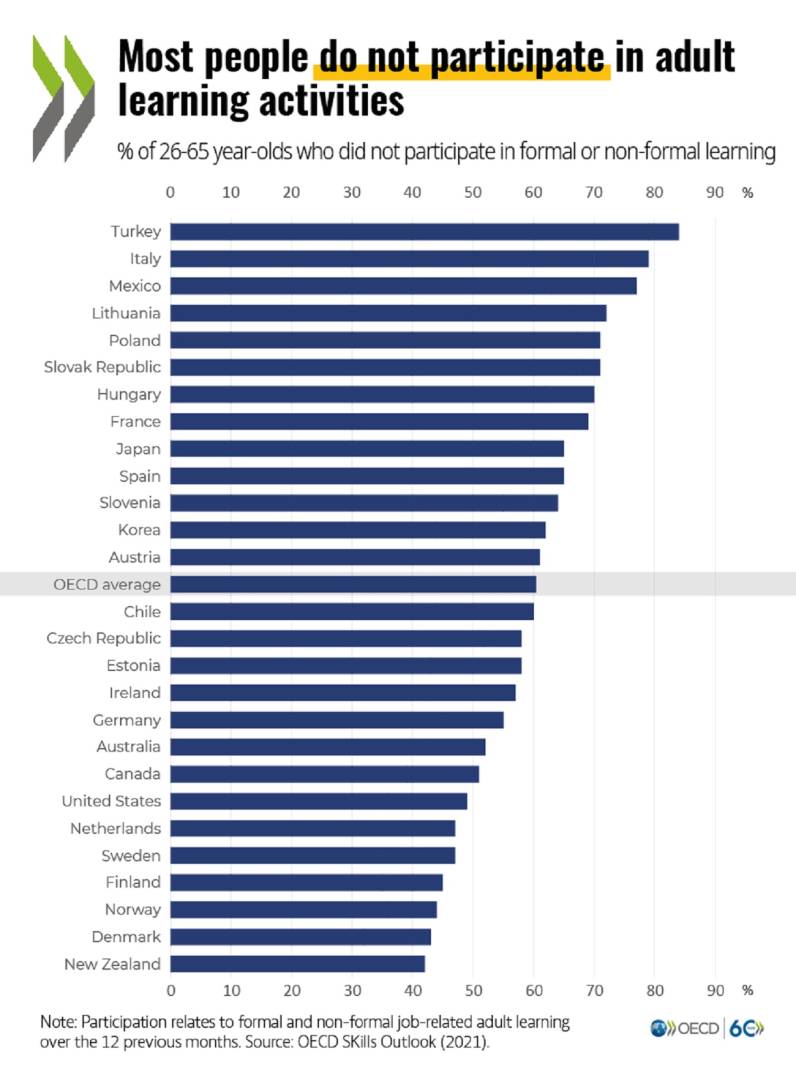OECD Skills Outlook 2021 rings alarm bells on adult learning uptake
17 June 2021
The OECD’s Skills Outlook 2021 discusion on ‘Learning for life’ could not have been timelier (https://www.oecd.org/education/oecd-skills-outlook-e11c1c2d-en.htm). Not only is participation in lifelong learning insufficient due to a varying set of reasons, but the pandemic made it even more difficult to pursue any type of training. This is against the backdrop of underemployment, lost working hours and a looming jobs crisis. Over one year on OECD average, 18% of hours of non-formal learning including on-the-job training and around 25% of informal learning were lost. Six in ten adults did not take part in any training during this time. Only one out of the six was willing to do pursue training, showing a high level of disengagement. One in two adults already disengaged before the pandemic.

At the publication’s launch, the OECD Secretary General, Mathias Cormann, argued for more investments in adult learning systems, targeted support to vulnerable groups and the involvement of stakeholders – including social partners. Nicolas Schmit, European Commissioner for Jobs and Social Rights, also stressed that social partners are a key player in learning societies. Now, the 230 pages strong Outlook does not hint to that. It does not discuss social dialogue and collective bargaining as instruments aside from 3 examples (UK’s Union Learn, the French Formation en Situation de Travail (FEST), and Italy’s Tesmec Group firm level agreement). It does acknowledge the role of trade unions alongside other actors in the design (p. 29) and funding (p. 152) of lifelong learning – but that is about it. The TUAC has delivered examples of trade union impact on creating access and enhancing participation in training recently and has highlighted its members’ activities since the onset of the crisis. Given the strong call of the Outlook to invest in and enhance lifelong learning opportunities, more discussion on social partner involvement should emerge.
To explain contributing factors to adult training uptake, the Outlook dives into the individual level starting with the foundations laid during early learning. The so-called ‘lifelong learning mindset’ would increase with higher enjoyment of reading, the motivation to master tasks and self-efficacy. All of which would also depend on parental support (and educational attainment as well as socio-economic background) and “teacher enthusiasm” – both of which understandably challenged during the pandemic. The OECD’s PISA scores are taken to estimate the likelihood to pursue tertiary education or quality vocational education and training. Yet, foundational skills are likely to increase substantially up until the age of 27 – which then truly depends on training systems, opportunities to transition to higher educational levels and the efficacy (and accessibility) of employment services. This should be explored further.
On future skills needs, the OECD’s emphasis on diversified training offers corresponds to TUAC’s prior analysis. The OECD also points to digital skills creating more resilience during the crisis (e.g. to take up digital learning or telework). In the longer term, demand for STEM professionals will grow – such as a 21% increase in demand for software developers by 2029. And, while this assessment helps guide future learning pathways, OECD work should combine these insights with recommendations on how to expand training rights (e.g. to non-standard workers or people under short-term working schemes) and make training accessible and affordable (without putting the administrative and/ or financial burden on workers alone). This – together with anticipating future skills needs for the green and digital transitions – will be essential in follow-up work.
